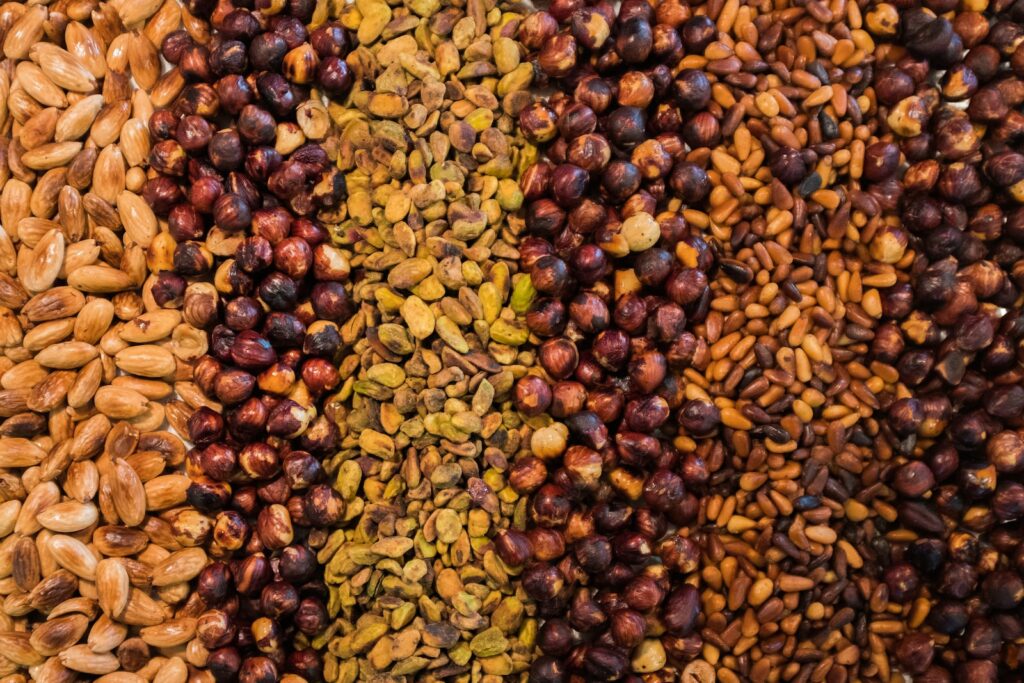Parakeets, one of the most adored pet birds, require a balanced diet to flourish. As a bird enthusiast and pet owner, you may be exploring ways to diversify your parakeet’s diet. Among various food options, nuts and seeds can offer valuable nutrition and taste variety. However, the question arises: which nuts and seeds are safe for parakeets to eat?
In this guide, I will draw from my extensive experience with birds to explore the types of nuts and seeds that are safe and beneficial for your feathered friend.

The Nutritional Bonanza in Nuts and Seeds
When you’re running low on traditional bird food like pellets and seeds, a diverse selection of nuts can come to the rescue. Almonds, walnuts, pecans, hazelnuts, pine nuts, and cashews are suitable for parakeets, and seeds such as sunflower, pumpkin, millet, safflower, and canary seeds offer both nutrition and variety. Keep in mind that, while nutrient-rich, these treats are high in fat, so moderation is crucial.
- Almonds: Almonds offer a burst of omega-3 fatty acids, making them an outstanding snack for your parakeet. Make sure to include these in your bird’s diet in moderation.
- Walnuts: Walnuts provide protein, unsaturated fats, and vital minerals like calcium and iron. They also have dietary fiber and contain no cholesterol. Feed your parakeet a few walnuts at a time to avoid overconsumption of fat.
- Pecans: Pecans bring an array of nutrients to your parakeet’s diet, including unsaturated fats, protein, calcium, iron, and magnesium. Just like other nuts, pecans should be offered in moderation.
- Hazelnuts: Unroasted and unsalted hazelnuts can be a delightful treat for your parakeet. They are a source of healthy fats, protein, and essential vitamins and minerals.
- Pine Nuts: Pine nuts, rich in Omega-3 fatty acids, offer essential fatty acids to your parakeet. As they are naturally low in sodium and high in protein and unsaturated fats, they are an ideal treat.
- Cashews: Cashews, with their healthy fats and an array of amino acids, vitamins, and minerals, provide nutrition and energy for parakeets. Stick to plain, unsalted cashews to prevent excessive sodium intake.
- Macadamia Nuts: These nuts can add essential Omega-3s to your parakeet’s diet, improving their overall health and well-being. Make sure they are unsalted before offering them to your bird.
Overall, while these nuts provide substantial nutrition, they should only constitute a maximum of 20% of your parakeet’s diet.
Seed Treats for Your Feathered Friends
Seeds are a tremendous source of energy for parakeets and can offer a nutritious supplement to their regular diet. Here are some notable seeds for your bird:
- Sunflower Seeds: High in energy, these seeds also contain vital vitamins and minerals for your parakeet’s health. They help maintain shiny and healthy feathers and should be included in your parakeet’s diet.
- Pumpkin Seeds: These seeds are rich in protein, fat, and essential vitamins and minerals such as vitamins A, B1, and niacin. Make sure to remove the shells before offering pumpkin seeds to your parakeet.
Seeds should be offered alongside other nutritious fruits and vegetable treats such as lettuce, apple, carrots, banana, and corn. When it comes to nuts, almonds, and peanuts, they make a safe snack for parakeets. Additionally, millet spray and popcorn (unsalted) can be offered as special treats.
- Cashews, Pistachios, and Peanuts: These nuts are safe for parakeets and provide a great source of protein. Avoid raw peanuts due to potential bacterial contamination. Opt for shelled pistachios or roasted pumpkin seeds instead.
- Millet Seeds, Safflower Seeds, and Canary Seeds: These seeds can be a great source of essential vitamins and minerals.
- Millet is rich in magnesium and phosphorus, which help maintain bone and muscle health.
- Safflower is low in fat and rich in essential amino acids.
- Canary seeds are high in protein and contain vitamins A, B-complex, and E.
- Acorns, Pecans, and Walnuts: These nuts are safe for parakeets to eat in moderation. They provide protein and offer omega-3 fatty acids essential for a healthy diet.
I hope this guide sheds light on the best nuts and seeds for your parakeet. Remember, a balanced diet is key to ensuring your feathered friend thrives. Whether you’re a veteran parakeet owner or you’re bringing one home for the first time, this guide will help you make informed dietary decisions for your bird.
As an experienced bird caretaker, I recommend consulting with a vet before introducing any new foods into your pet’s diet to ensure their safety and well-being. Here’s to the health and happiness of your parakeet! Stay tuned for more insightful pet care tips.

jay
I am not an expert, just passionate. I own a Parakeet and I have been in your shoes. If you are currently looking for information, I've done the research and that is the reason why I created this website.
